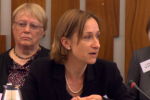Cécile APTEL
contribution 08 -
APTEL Cécile

tags
ICTR beginningstranstlated version
Thank you. I would also like to take my turn to thank the organisers of this committee which is totally exceptional on many counts.
To remain in the realm of the Prosecution policy of the ICTR, I think it is proper to go into the roots of the establishment of the International Criminal Tribunal for Rwanda following the crimes committed in 1994.
For the record, the ICTR was set up for two reasons. First of all, to act as an impartial judge in trying the crimes committed in Rwanda, but also because there was a lack of capacity and resources in Rwanda. And I’m going to revisit the two points, because they are important to illustrate the limits of Prosecution policies.
First, neutrality and impartiality. This is the attribute of an international court, but the flip side of the coin of using international prosecutors and investigators is that you have people who are not aware of the political, cultural and historical context where they are going to conduct their investigations. That was certainly one of the problems faced by the initial teams, like the Dutch team that you mentioned earlier, and I believe it is also a problem to the international prosecutors, even the Prosecutor in chief.
When people are not aware of the context in which they are going to work and they are required to identify the persons responsible in a certain but abstract context, how are they expected to do that task. Even when the context is known, it is hard to determine who the big fish are.
In that context, the international prosecutors tried to identify the targets by analysing the existing sources, for instance, reports made by NGOs, as well as expert witnesses, and the extraordinary role played by the expert witnesses. And some of them are right here in this room. Unfortunately Alison Des Forges, who played that role, is not with us today, but these expert witnesses played a key role in guiding and explaining the work to be done.
And I believe that is the issue at hand, when international prosecutors are required to find the culprits out of context, they are guided by evidence by their own investigators afield. Based on the logic that establishes a link from the bottom to the top, from low to high ranks, we have seen that it is a very long process and not very effective.
On the other hand, Prosecutors tend to examine from the top in order to determine individual targets. But how do identify specific targets, especially when the entire material is not grasped? And that is the ambivalence between individual responsibility and political responsibility, which is also what is expected of international courts.
And when the Media trial is referred to, or the Government I, Government II trials, don’t we go beyond individual penal responsibilities so as to come up with political responsibilities? And that is the sensitive context in which international prosecutors work.
Regarding resources, if the ICTR was set up to counter the lack of resources, then the question arises which are the resources of the ICTR and of his Prosecutor to determine the criminal strategy before the trial. Are they necessarily more important than for national courts? Not necessarily, as international courts and their prosecutors do not have coercive power. That, too, influences on the determination of the prosecution policy.
Retrospectively, we can see that the reasons that justified the creation of the ICTR – neutrality and more resources – also seeked to give the prosecutor a maximum of liberty. Nevertheless, retrospectively we notice that the prosecutor’s margin, regarding discretion, were actually limited. It is out of range to measure the prosecutor’s discretion margin – which would allow him to define without any strings his prosecution policy – outside of the missing context, not because of the international prosecutor’s lack of independence but because of the lack of resources that would have allowed the prosecutor to carry out his independence.
You said that there is no police function, and the international prosecutors do not have coercive power, as international courts depend entirely on the States.
The international community, in terms of access and arrest, including the United States. I was among those few who were at that meeting, but I let Pierre Prosper and Carla del Ponte discuss the details of that meeting. So on one hand we use international means in our work, but on the other hand we have to access to evidence and the collection of evidence in the country concerned, that is, Rwanda. The fact that the ICTR from the very beginning set up its investigations office in Kigali caused the ICTR to be dependent on Rwanda, which cannot be compared to the ICTY, which never had an investigations office on the field. And same applies to ICC; we don’t have investigation offices in the targeted countries.
The ICTR from the very beginning had an office and had prosecutors on the field on whom pressure could be exerted, even from a security point of view. So every international prosecutor has been confronted with the responsibility for his team and a huge lack of resources. So we have to look back, and it is observed that it is illusory to appraise the indiscretion margin of an international prosecutor and the definition of a criminal prosecution, if it is judged out of context, not in terms of his independence, but the lack of resources that means the international prosecutors’ independence.
(Recess from 3.40 p.m. to 4 p.m. )
J.P. GETTI
It is 15h40. Do we need to take the break now? We will break off now and reconvene at 4 p.m. If it is possible, we need to end our break at 4 p.m. so we can resume right on time.
(Recess from 3.40 p.m. to 4 p.m. )

